FRANCIS, A POPE OF THE POOR? A POPE FOR THE ENVIRONMENT? OR A POPE OF THE GLOBAL ELITE?
by Matt Smyth, Professor at Strasbourg University – Religious Studies
Pope Francis. A pope of rupture. A pope for ecology. Inimical to capitalism, but compassionate to the poor and the migrant. The gay-friendly pope. Lenient with divorcees, but hostile to traditionalists and conservatives. The reformer of the corrupt Roman curia, the enemy of sexual abuse perpetrated by clerics… Or rather the pope of paradoxes? It is with Bayer-Monsanto and BP that Francis hopes to save the planet, with Bank of America as well as with Big Pharma’s own Merck and Johnson & Johnson that he fancies conjuring up an ethical capitalism. Would he be then more like the pope of a new marketing logic? As it happens, it is precisely in the name of defending the environment, inclusivity, equity or social justice, that the corporate ‘stakeholders’ of the global governance are trying to enforce their agenda — which is nothing less than converting the whole planet and every human dwelling on its surface into assets tradeable on the stock market.
Bergoglio, in that respect, is a case study. Following in the wake of Davos’ World Economic Forum (WEF), he has turned the Vatican into a spokesperson for the global governance. Meanwhile, the policymakers of this very governance, since they are no longer willing to exploit the consumerist lust for happiness of the masses, but would now rather bet on coercion, have wrought a new marketing strategy. They hide their old endless yearning for power behind a fresh storytelling: the need to part radically with individualistic, energy-intensive, neoliberal capitalism. The global elite is accumulating all the goods it is still short of, confiscating civil liberties and concentrating all the power in its own hands, however this coup is being staged within a new narrative of being concerned about climate change and biodiversity, dedicated to the common good, hostile to selfish individualism, and negative when it comes to the free market. Otherwise stated: communitarian. As a matter of fact, Francis’ message to the world epitomizes this new kind of ‘responsible capitalism’ PR. Down to every single catchword.
The pope of lockdowns, contact tracking, forced medical experiments and segregation
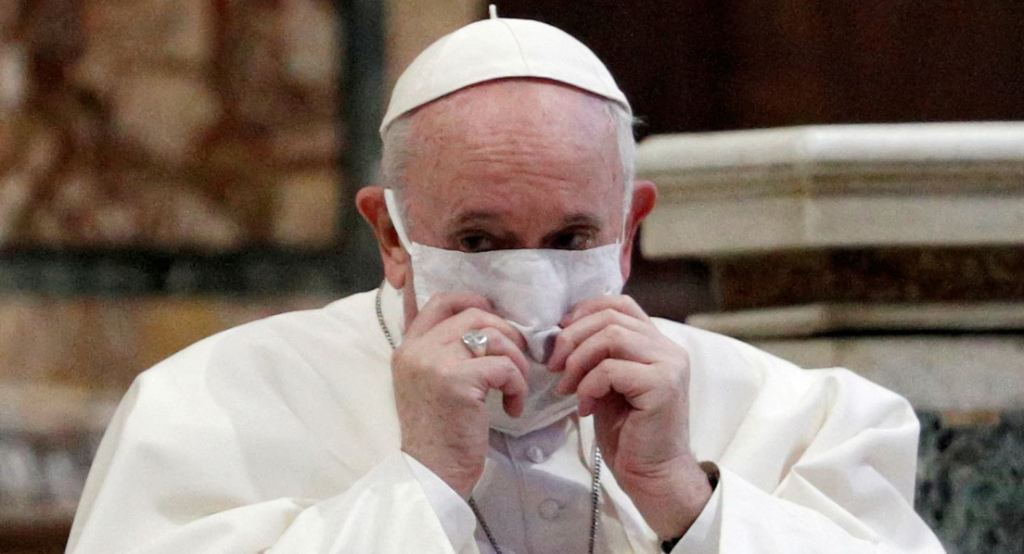
Pope Francis emerged, at the end of winter 2020, as one of the major public voices in favour of the so-called sanitary restrictions that were implemented around the globe at the time by national public health agencies and governments, in accordance with the WHO’s guidance. When, to the great dismay of many Catholics, governments began to outlaw religious gatherings, the pope didn’t lose time in weighing in on the matter with all his authority in favour of these policies. For the first time in history, a Successor of Peter, together in this with the secular powers, forbad Catholics to go to Mass, or to any other ceremony, even the Easter Vigil, calling for people to stay ‘obedient’ to their governments’ lockdown measures. The few bishops, such as Bp Schneider, who dared to oppose these restrictions would get scolded or ignored —as they were conservatives whose words were easy to spurn in the eyes of mainstream media. For instance, Abp Viganò was quick to publicly expose this collusion between the present papacy and the corporate global governance, but mainstream medias made sure his message wouldn’t get through.
His Polish predecessor’s favourite catchphrase had been ‘Be not afraid’, but the Argentinian pope had no qualm about joining his voice to the choir of all those who sung, like the former British health secretary Hancock or his French counterpart Véran, the antiphon composed by ‘health experts’: Be afraid! An antiphon of which verse could have been: Until we have a vaccine, we have no other option to curb the infection rate than XI Jinping’s own brand-new approach.
In November 2020, Francis took it upon himself to defend the Chinese tactic from the general public’s scepticism in the so-very-consensual New York Times: “As if measures that governments must impose for the good of their people constitute some kind of political assault on autonomy or personal freedom!” People are stuck in lockdown, families can’t be reunited, collective rites are banished, elderly folk die in isolation, family businesses are wrecked, thousands of youngsters are pushed to commit suicide, but it’s for their own good. The few governments that dared not to give in to panic, and would not comply with the directives from the CCP and the WHO, were severely chastised by Bergoglio as “governments that shrugged off the painful evidence of mounting deaths, with inevitable, grievous consequences”.
Since then, he has become the staunch advocate of the universal genetic experimentation campaign known as vaccination, even for children. Not a word on the success of early treatments trialed in poor countries. Not a word on the extremely low lethality of SARS-CoV2. And, of course, not a word on the highly experimental nature of the genic injections concocted by Pfizer, Moderna, AstraZeneca or Johnson & Johnson. Again, Bergoglio falters not one iota from the official narrative relentlessly hammered within the mainstream media: the world is confronted with a daunting threat; stay home or at least practise ‘social distancing’, accept contact tracking and wear a mask; universal vaccination is the one and only road to salvation.
He wishes to enforce on every human a genetic experimentation, be that through marketing, blackmail or simple coercion
In his interview book Oltre la tempesta, Francis, along with MSM and politicians, tells the public to ‘Believe in science.’ The Successor of Peter sets his faith and hope in the triumphant announcements of Pfizer or Moderna, just as his predecessors would have done with the articles of the Christian Creed: “We need to regain our hope and faith in science today: thanks to the vaccine, we shall slowly find back our way to the light”. We cannot, even for a second, presume that he chose this wording ‘faith and hope’ by accident. Out of the mouth of a pope, such words can only refer to the first two Christian virtues known as the theological virtues.
Francis exerts all his clout to foster the global policy implemented by the G20 governments (and quite a few more). Like the other heads of state, he wishes to enforce on every human a genetic experimentation, be that through marketing, blackmail or simple coercion. In a famous video, the pope doesn’t refrain from describing the injection as a ‘moral duty’, and even as an ‘act of love’ (the third theological virtue, as it happens). The potential dangerousness of the said injections doesn’t seem to worry him in the least. Nor what the outcome might be for the children, since he also wishes to see them all getting the injection, even the very young ones. And the Vatican now has a vaccine mandate.
Even more surprising: the Congregation for the Doctrine of the Faith —the former Holy Inquisition— published a document in order to remove any reluctance the faithful might have felt to the idea of being injected with a product developed from cells derived from aborted human foetuses. Rome, thus, and all the episcopal conferences in the rest of the world, in order to conform with the official vaccinal orthodoxy preached by the likes of Bill Gates, did not back down from breaching a two thousand years taboo of Catholic orthodoxy on abortion. Because of the public health emergency. Again, Francis had only to deal with a handful of dissenting bishops.
It is no surprise then that Francis is very much in favour of the health passport. He imposed the said passport within the Vatican territory and in some seminaries. Furthermore, as I mentioned, the genetic experimental injection is now compulsory at the Vatican. In the wake of this mandate, some zealous dioceses, notably in Canada, have begun to require proof of ‘vaccination’ from churchgoers. As for the blackmail, violation of privacy, digital universal surveillance and social segregation that the health passport implies, such things don’t seem to very much bother our Argentinian pontiff.
A pope to the global partnership
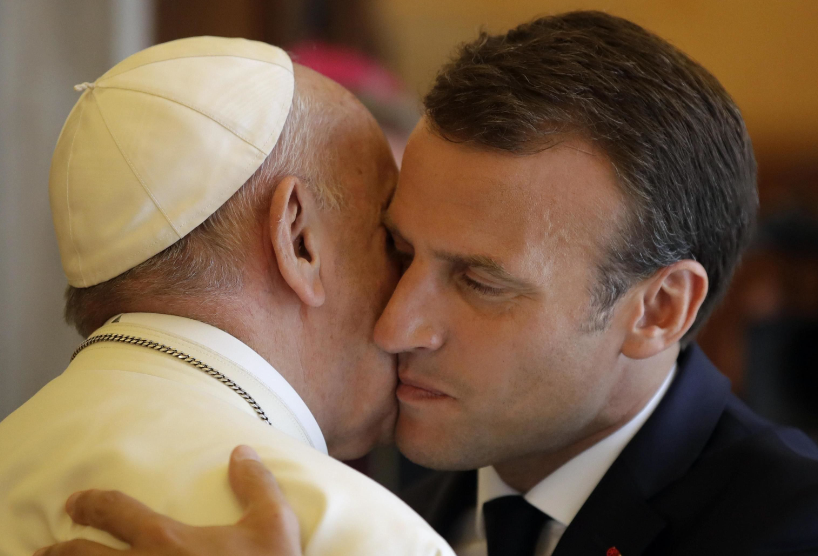
Is this simply another example of an institution swimming with the stream? After all, the pope is merely singing the same tune as all the other Western heads of state. But there is more to it: Francis Bergoglio sees himself as an active partner of the great social and economic upheaval instigated by the global governance in the wake of the Covid crisis, and advertised by the WEF under the ‘Great Reset’ brand name. As it happens, this global governance is supposed to gather the world’s public and private ‘stakeholders’ inside a ‘partnership’. The latter, which is more like a subservience of the state to the corporate global elite, is meant to allow the technocratic managerial ruling class to decide the planet’s future far from any democratic process. This is what they call the Global Public-Private Partnership (GPPP or G3P).
‘Stakeholder capitalists’, as they like to call themselves, represent the senior partners. Basically, these are the financial and Info Tech complex, that is to say the finance industry (BlackRock, Vanguard and the SIFI international investment banks) in collusion with Info Tech (Big Tech), under the aegis of the central banks (BIS, Fed, ECB and BoE), while good old Big Oil (and all the industries, such as Big Food, depending on it) stands in the background. They consider themselves to be responsible as a whole for global public common good in a decisive and vital way. These CEOs and chairmen are the real policymakers. The junior partners are the governments and their respective state apparatus (with the exception of China which holds a specific position in the food chain). States are some kind of ‘middle-management’ to the global corporate oligopoly… The global governance also relies heavily on international institutions such as the IMF, World Bank, WTO or OECD, NGOs such as the WHO, and, of course, the main private NPOs such as the Bill & Melinda Gates Foundation, Wellcome Trust or Rockefeller Foundation…
And then come the stakeholders’ global assemblies (for want of a better word), among which the Vatican looks forward to holding rank. The task of these particular NPOs is to think over the agenda conducted by the senior partners, and to coordinate the decisions of those in charge of implementing the policies derived from this agenda. Right now, the main one is undoubtedly the World Economic Forum (WEF), whose lifelong chairman Dr Klaus Schwab managed over time to allow the Davos Forum to become the inescapable ‘hub’ of the said global partnership. Contrarily to the low-profile clubs such as the central bankers’ Group of Thirty, the public-private Bilderberg Group and Trilateral Commission, or the older Chatham House and Council on Foreign Relations, the WEF takes on, with a lot of publicity, the mission with which it is endowed, by virtue of the corporate ‘community’ it serves. The global governance does not need to hide any longer. Actually, the WEF is in charge of its public relations, and is therefore at the helm of a huge marketing campaign designed to push ‘civil society’ to welcome the governance’s new policies: the Great Reset and the subsequent 4th Industrial Revolution. Upon the wreckages left by the COVID crisis and thanks to the narrow ‘window of opportunity’ the latter offers, stakeholder capitalists will be able to implement a new ‘responsible capitalism’ transcending both Keynesianism and Neoliberalism. Or so they say.
This glorious future, dreamed by the global stakeholders for ‘those who are nothing’, as French president and WEF’s Young Global Leaders Macron likes to say, is genially described in the WEF’s own Ida Auken’s now-famous words as an era where one “owns nothing, has no privacy and life has never been better”. (https://medium.com/world-economic-forum/welcome-to-2030-i-own-nothing-have-no-privacy-and-life-has-never-been-better-ee2eed62f710). Such a paradisiacal lifestyle will be generously gifted to the plebeians, after the current economic system collapses for good, by the great financial cartel in control of the multinational corporations’ oligopoly. The latter will exploit a global captive market, after the planned disappearance of most of the independent small companies. Such an absolute concentration of wealth and power in the hand of the technocratic elite will be achieved for good when fully controlled digital currencies, digitalization of manufactured objects (IoT: Internet of Things) and digitalization of human activities (IoB: Internet of Bodies) are implemented, allowing for continuous human data-mining through blockchain technology. That’s why this new era will entail the complete ending of our privacy to the benefit of total digital surveillance. In this ideal future, humans will be locked up in ‘smart —but sustainable— cities’ to fight climate change and defend biodiversity. They will eat synthetic but eco-responsible food (produced by our eco-friendly agro-business giants), and they will welcome the modifications allowing them to become ‘augmented’… This planetary coup, which could also be summarized as the grab and monetization of every aspect of nature, is to be rolled out —needless to say— for ‘our own good.’ Hence, the governance’s insistence on establishing a responsible, ethical net-zero, ‘green’ capitalism, willing to give everyone their chance in life, and ready to offer optimal health for everyone. This is how the gigantic financial and industrial corporations, whose infinite greed has so far made such a good job of methodically destroying the planet and ruining our health, intend to seize —so they are better protected of course— the last ‘assets’ (as they call them) that escape them (green plan to transform the global financial system). Our bodies, our freedoms and the ‘commons’…
Well, the Vatican, as I mentioned, is really keen to hold its rank among the managerial elite global assemblies, under the supervision of the financial titans such as BlackRock, along with the WEF or Chatham House. But with a subtle ‘religious’ and ethical dimension adorned by a venerable heritage. Such a prestigious patina is more than ‘bankable’ in the eyes of all these technocrats standing on the cutting edge of modernity. Very much like the ‘Mindful Meditation’ popularized by Jon Kabta Zinn, since blessed by the Davos managerial elite. Francis is able to grant the latter an ethical guarantee that is both televisual and ancient. These are assets the global governance is not willing to disdain, just as it doesn’t disdain the prestige of showbiz celebrities. Francis doesn’t quite compare with Davos figures such as Leonardo Di Caprio or Greta Thunberg, but he enjoys some kind of planetary popularity, notably outside his Church. To be sure, Catholicism is going through a sharp decline, even in its African or Latin-American former strongholds, within which Evangelical Churches are leaving deep dents. However, the pope remains the one and only religious leader whose clout extends to the entire world. No other religion is able to boast such global leadership. Thanks to an amiable papacy, the global governance is able to reach out to the entire world from the height of the See of Peter (and at least to what remains of the Catholic flock). I bet this is appreciated by Klaus Schwab, who sees himself, in the involuntarily hilarious cinematographic ode to his own glory, Das Forum, as the vicar of the world elite’s parish.
The pope of the Great Reset
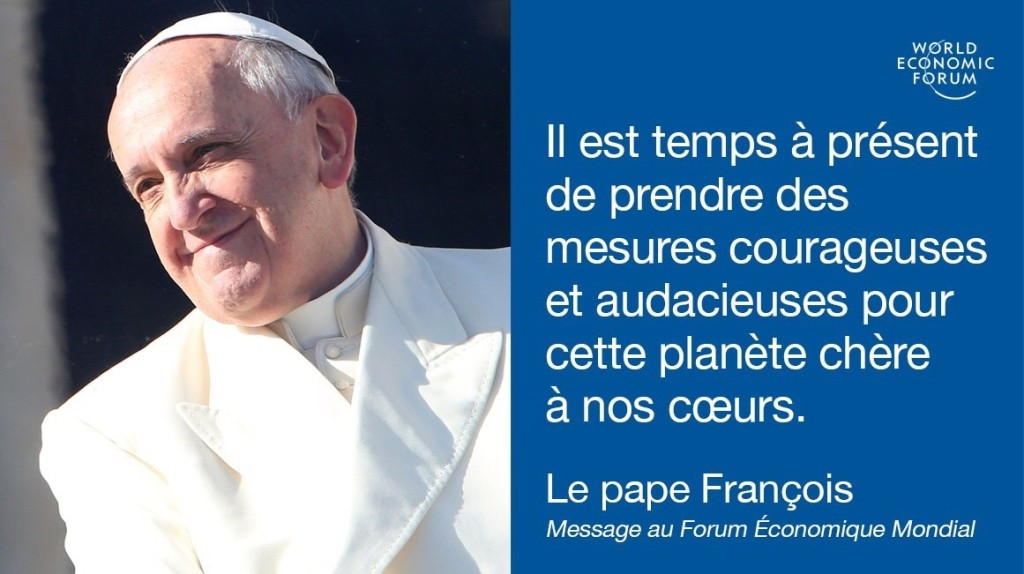
In addition to his role as a moral guarantee, Francis — but not quite as raucously — plays the same part in the game as poor Greta Thunberg with whom the Davos Forum likes to associate. In the same fashion as her, the present pope is a staunch critic of the actual economic system, and a champion for a net-zero sustainable world. As I mentioned, this is precisely the kind of narrative that the global policymakers, such as BlackRock CEO Larry Fink, have decided to hijack in order to sell us the great transformation they wish to implement.
Unsurprisingly, the Vatican is tightly linked with the international financial world: since 2006, the APSA (Amministrazione del Patrimonio della Sede Apostolica, the entity in charge of managing the Vatican’s huge stock exchange and real estate portfolios) could rely on Peter Sutherland as a Special Advisor. A loud champion of the ‘open border’ policy, he was also appointed to chair the International Catholic Commission on Migrations from 2015 to his death in 2018. This father of globalisation was formerly chairman of GATT, then the WTO’s co-founder, but also a chairman of BP and Goldman Sachs, and needless to say a member of the WEF’s Foundation Board, among many other things…
Similarly, in 2021, Pope Francis appointed a WEF Agenda Contributor, the very Malthusian economist Jeffrey Sachs, to the same Pontifical Academy of Social Science (Jeffrey Sachs who happens to be the director of The Lancet’s Committee on Covid and also to be a friend of Peter Daszak, chair of Ecohealth-Alliance, whom Sachs nominated for a while at the head of the Lancet commission on the origins of the pandemic, the same Daszak who supervised the financing of the coronavirus’ ‘Gain of Function’ research in Wuhan, because it’s indeed a small world).
He hopes to be one of the communicators of the great transition packaged by Klaus Schwab under the ‘Great Reset’ branding
As for Francis himself, the WEF was able to make use of his planetary image, since Francis sent a message to the annual Davos Summit on no fewer than four occasions. Furthermore, a Davos roundtable is chaired by a Vatican delegate every year.
Again, he appears to be a faithful spokesperson of the WEF’s storytelling. He hopes to be one of the communicators of the great transition packaged by Klaus Schwab under the ‘Great Reset’ branding. The introduction of the encyclical Fratelli Tutti (October 2020) is quite telling in this respect: “…the Covid-19 pandemic unexpectedly erupted, exposing our false securities. Aside from the different ways that various countries responded to the crisis, their inability to work together became quite evident. For all our hyper-connectivity, we witnessed a fragmentation that made it more difficult to resolve problems that affect us all. Anyone who thinks that the only lesson to be learned was the need to improve what we were already doing, or to refine existing systems and regulations, is denying reality”.
According to Bergoglio, the crucial element of this mutation is precisely the establishment of such a global public-private partnership governance. In his 2021 message to the World Bank and the IMF, framed within all the communitarian pathos, he states that the present genetic experimentation roll-out opens a perfect window to this global partnership (devoid of too many democratic constraints): “we especially need a justly financed vaccine solidarity, for we cannot allow the law of the marketplace to take precedence over the law of love and the health of all. Here, I reiterate my call to government leaders, businesses and international organizations to work together in providing vaccines for all, especially for the most vulnerable and needy (Urbi et Orbi Message, Christmas Day 2020). It is my hope that in these days your formal deliberations and your personal encounters will bear much fruit for the discernment of wise solutions for a more inclusive and sustainable future. A future where finance is at the service of the common good, where the vulnerable and the marginalized are placed at the center, and where the earth, our common home, is well cared for”.
It is a leitmotif. John XXIII (encyclical Pacem in terris), the Second Vatican Council (Constitution Gaudium et spes) and also Benedict XVI (encyclical Caritas in veritate) all shared the belief that we are in “urgent need of a true world political authority” (Caritas in veritate § 67). However, Bergoglio, in his encyclical Laudato Si’ of 2015, or in his message to the UN the same year For an Integral Ecology, relentlessly calls for a stronger global governance, notably in face of climate change. This call to policymakers for a mobilization against global warming is an aspect of a more general denunciation of the free market economy, along with the consumerism and commercial competition that are integral parts of it. Again, this ‘progressive’ narrative is fully in line with the global elite’s agenda: consumerism and competition do not fit with a captive market in the hands of an oligopoly; while the climate or infectious threats that are supposed to be our current nemesis represent the closing stage of the Westphalian nation-states’ history.
Quite logically, Francis calls for the birth of a new world order out of the ruins left by the ‘pandemic’: “Let us all keep in mind that there is something worse than this crisis: the drama of wasting it. We cannot emerge from a crisis the same as before: we either come out better or we come out worse”. It is difficult to fail to recognize the now familiar storytelling of the WEF’s chairman Klaus Schwab: “The pandemic represents a rare window of opportunity rare to reflect, reimagine and reset our world”. Furthermore, pope Francis joined the choir of world leaders (or ex leaders), Joe Biden, Kamala Harris, Nancy Pelosi, Boris Johnson, Matt Hancock, Justin Trudeau, Mark Rutte, Jacinda Ardern, Bill Gates, Tony Blair, Prince Harry, Antonio Gutteres, Obama, Hilary and Bill Clinton, Sadiq Khan etc. pleading for us to ‘build back better’ once the ‘pandemic’ is over. For instance, according to Francis, “The path to humanity’s salvation passes through the creation of a new model of development, which unquestionably focuses on coexistence among peoples in harmony with Creation” (God and the World to Come), and, therefore, it passes through the policies advocated by global governance, such as Universal Basic Income (in the wake of the Covid crisis of course).
The pope of Bayer-Monsanto: a historical turning point
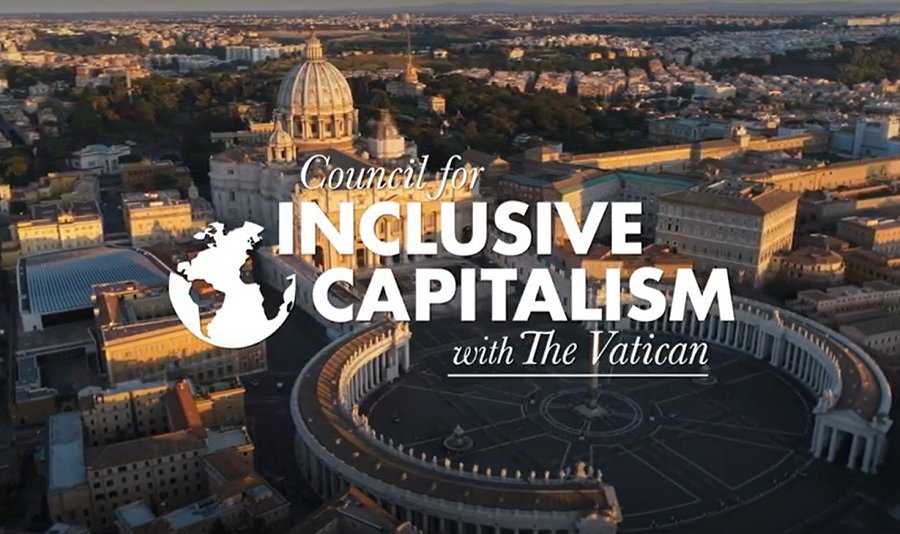
Internal crises are not a new thing to the papacy. Rome, for a long while, became a tool in the hands of power-hungry pontiffs filled with earthly ambitions, or on the contrary a tool in the hands of a prince in need of apostolical standing. The Holy See is known to have, once or twice, sought some rather embarrassing external help or compromise. In 1830, Pie VIII condemned the Polish Catholic insurgents to please the Czar. In 1888, Leo XIII excommunicated Irish Catholic protesters to gain the favour of the British Empire. Since then, the Vatican has been prepared to enter into lengthy negotiations with Lenin, strike a deal with Mussolini and sign a concordat with Hitler… However, this is a turning point: never before has a pope been tempted to embrace the ideologies of the regimes with which he has pursued an arrangement. Never has the papacy been driven by the ambition to spread their agenda.
Today, nonetheless, an institution that proclaims its universal jurisdiction over Christians is at the same time endeavouring to partner with a technocratic global governance thriving under the aegis of big corporations. Rome sees itself as some kind of ‘spiritual’ partner of the corporate elite aspiring to completely dominate the planet. This affiliation to the global agenda was formally acknowledged when Lynn Forester de Rothschild launched the Council for Inclusive Capitalism with The Vatican, ‘under the guidance’ of pope Bergoglio and Cardinal Turkson. Around the pope, and around the smaller fellowship of the ‘Guardians for Inclusive Capitalism’, the Council gathers the ‘world’s business and public sector leaders’, notably CEOs in search of a ‘sustainable’, ‘resilient’, ‘inclusive’, ‘responsible’, ‘equitable’ and ‘fair’ capitalism (I hope I didn’t miss a catchword), such as the CEOs of Johnson & Johnson, Merck, Bank of America, BP and Bayer-Monsanto (whose ethical and environmental expertise is recognized worldwide). By their side, we find the Ford and Rockefeller Foundations’ chairmen, and the herald of the Net-Zero finance industry, the ubiquitous Mark Carney. The Council “is an historic collaboration of CEOs and global leaders inspired by the moral guidance of His Holiness Pope Francis. Ours is a moral and market imperative to make economies more inclusive and sustainable with a movement of bold, business-led actions that span the economic ecosystem”.
Pope Bergoglio is orchestrating a marketing campaign for the global governance’s agenda
The founder and chairwoman of ‘The Council’ (as they say), Lynn Forester de Rothschild, herself managing partner of Inclusive Capital Partners (and Jeffrey Epstein’s longtime friend), states that “Capitalism has created enormous global prosperity, but it has also left too many people behind, led to degradation of our planet, and is not widely trusted in society. This Council will follow the admonishment of Pope Francis to listen to ‘the cry of the earth and the cry of the poor’ and answer society’s demands for a more equitable and sustainable model of growth”. Unsurprisingly, their website (‘commitments’) is very much aligned with the seventeen UN and WEF Global Goals for 2030. Our ‘inclusive capitalists’, like the WEF, hope to display a narrative that is intended to be perceived as ‘leftist’ or at least communitarian: they insist that modern big economical movers should be held accountable for their impact on the environment, notably on the climate; for their choice to be inclusive of all kinds of minorities; for their willingness to give everyone a chance; for what they do to welcome refugees… In the same fashion Francis, the smiling and benevolent fatherly figure of ‘responsible capitalism’, wishes to be perceived as the gay-friendly pope, a friend to the migrants, and the ‘green pope’ known for his hardcore militancy against climate change. In other words, pope Bergoglio is orchestrating a marketing campaign for the global governance’s agenda.
The same narrative—with all its catchwords—is displayed within the documents of the Dicastery for Promoting Integral Human Development created in 2016 with the merging of various other Roman commissions, and chaired by the same Cardinal Turkson from the Council of Inclusive Capitalism. “The Dicastery […] expresses the Holy See’s concern for issues of justice and peace, including those related to migration, health, charitable works and the care of creation”. Notably, the Dicastery is asked by the pope “to express the Church’s solicitude and care for the whole human family facing the COVID-19 pandemic”. Indeed, “The COVID-19 pandemic is the defining crisis of this generation”. Thus, the Dicastery’s aim is to supervise “research and studies of the present COVID-19 epidemic and its related issues and to think about a post Covid-19 society and world, especially in areas of ecology, economics, labor, healthcare, politics, communications and security” (vatican-covid-19).
The pope of the 4th Industrial Revolution and transhumanism
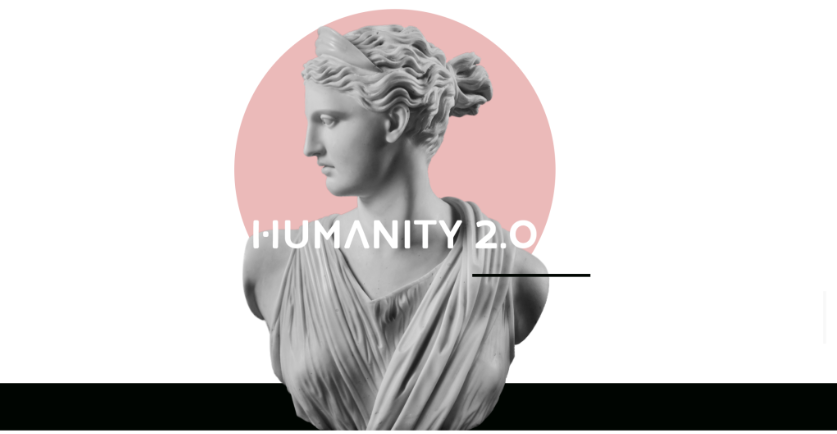
With whom should we reflect on this future ‘post-Covid society and world’? Well, for instance, with the Roman NPO humanity2-0.org, ‘developed’ by Father Philip Larrey.
“Developed in collaboration with the Dicastery for Promoting Integral Human Development at the Holy See and a consortium of leaders and luminaries, Humanity 2.0 seeks to unite humanity in the common cause of realizing a better world for our children”. And since “Humanity 2.0 is a vehicle for facilitating collaborative ventures between the traditionally siloed public, private and faith-based sectors”, CEOs such as those of CISCO, Virgin or Publicis, have joined in to bless this partnership with their corporate power. No reference to Christianity on its website, watched by a figure of the Goddess Athena, but a brief quote from Thomas Aquinas.
Its chairman, Father Larrey, is a priest and the dean of Faculty of Philosophy at the pontifical Latran University, but also an apostle of the 4th Industrial Revolution (actoninstitute.it), dear to the heart of Klaus Schwab. He is the author of Artificial Humanity, a book where he displays his faith in future Artificial Intelligence—as an entity endowed with real intelligence—, but hopes that it remains human.
Francis, while proclaiming his faith in what he believes to be tomorrow’s technology and AI in particular, seems to be quoting father Larrey almost ad verbatim, adding only his own personal communitarian tone. In a short videoclip, the pope invites Christians to “pray for a ‘human’ AI”. Because “robotics can make a better world possible if it is joined to the common good. […] Let us pray that the progress of robotics and artificial intelligence may always serve humankind. We could say: may it ‘be human’”. At a Davos Summit, but in the context of growing unemployment due to automation, he declared that “Artificial intelligence, robotics and other technological innovations must be so employed that they contribute to the service of humanity and to the protection of our common home, rather than to the contrary” (Davos Forum 2018). We are not very far from the transhumanist creed advocated by its mainstream media spokespersons such as Yuval Noah Harari. AI might actually be dangerous, however for the plebs to be protected from its potential evils, we need the technocratic elite to be in charge…
Transhumanist ideology, notably its belief in the future advent of a Great Biodigital Convergence, is a key point of the 4th Industrial Revolution preached by the WEF. The human and the machine will have to merge through data-mining, with the help of genome editing and digital implants, so that we can give birth to an ‘augmented human.’ The barrier between random biological entities and programmable digital technologies will be removed. The very idea of life as well as that of freedom are obsolete: life and notably the human soul are but extremely complex algorithms drawn from chemical and electromagnetic reactions. He who will master the data of these algorithms will thus be able to ‘hack’ human beings, as Yuval Noah Harari puts it, in a speech delivered to his Davos masters in 2018. Furthermore, even the transhumanistic hope in an eternal life, fulfilled either through cellular ageing prevention or through “Whole Brain Emulation”, is starting to attract large investments from big companies. But, even with a lot of imagination, it seems rather difficult to reconcile these dreams with the teaching of Francis’ predecessors.
This didn’t stop Father Larrey chairing two meetings given in Rome at the Teutonic College, along with Carlos Moreira and David Ferguson, under the patronage of a mysterious Elite Global Leaders Conference. Both Moreira and Ferguson are famous for being advocates of transhumanism, for having co-authored the Transhuman Code, and having created the oiste Think Tank which is part of the WEF’s galaxy. The first, held in July 2019, dealt precisely with the Transhuman Code. The same zealous apostles of the future technocratic utopia came back in October 2021 to discuss the ‘Technology that Empowers Humanity’…
‘For things to remain the same…’
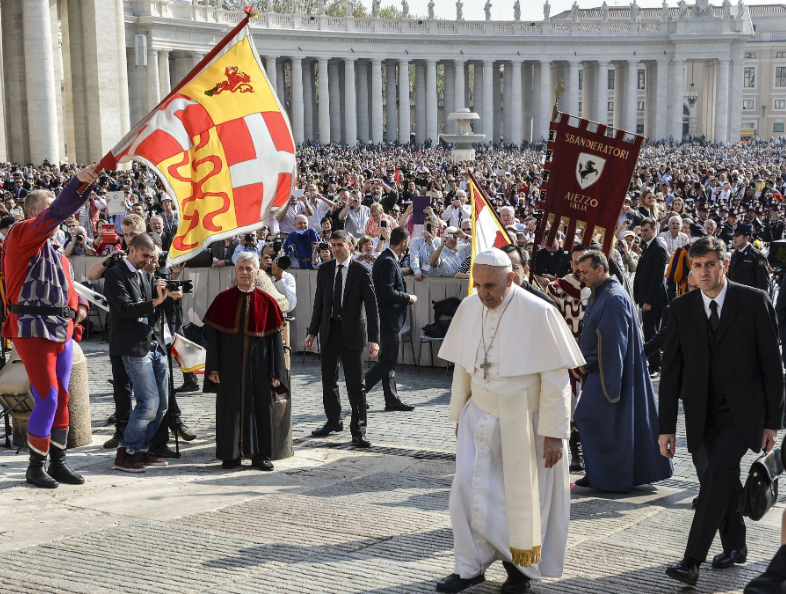
How could the papacy transform itself so radically? It is a challenging question to the historian. The various ecclesiastical scandals with which Bergoglio is personally involved might provide us with the beginning of an explanation. This pope is known for covering up to the bitter end the crimes perpetrated by high prelates (McCarrick, Zanchetta, Maradiaga and many more), although all of them were facing grave and well-documented accusations of sexual abuse or financial corruption, or even both. Only full public exposure made possible their dismissal. Bergoglio emerged as what he really is: a bureaucrat ready to protect his fellow collaborators at any price. On the other hand, this is the same man who was trying to please public opinion while strengthening Rome’s policy against sexual abuses committed by ordinary priests. A decent communicator, as are most modern top managers, he is always ready to spin his institution out of trouble with well-practised storytelling.
Religious conservatives who are worried about the exhibition of Pachamama statuettes in a church near the Vatican need not be. Such displays do not constitute a statement of syncretism nor of ecological neopaganism. No more than do the loud public pledges to the ‘defense of the planet’, ‘against climate change,’ or ‘in favour of the environment’ staged by the financial or industrial so-called stakeholders. Francis doesn’t worship Mother Earth any more than his private sector partners, hell-bent on a massive grab of what natural goods are left. This is pure spin.
However, the world is indeed changing and Rome is changing too. Clearly, the top of the Catholic hierarchy doesn’t want to take a counter-cultural stand: it would rather follow dominant ideology, even to the price of swallowing a certain amount of transhumanism. Was the Jesuit Bergoglio once under the influence of the mystical scientism of Teilhard de Chardin S.J.? Maybe. However, there is another simpler reason for this move. The papacy is now in reality extremely weak and Francis cannot accept this. All over the world, churches are empty or emptying, even in its former strongholds such as Latin America. The only communities that survive are tiny, scattered, and display a fair amount of conservatism, even sometimes traditionalism. The Vatican, as such, has become a terribly outdated institution, not very well suited to the size and reach of the communities it is supposed to supervise. Although he carries on doing so, in the face of official statistics, the pope is not really in a position to speak to humanity as if he were still some spiritual and moral authority followed all over the world by more than a billion of the faithful. The only card left in his hand, in a secularized world, is what he still represents in theory, but not in reality: a certain aura associated with his white cassock, Saint Peter’s Plaza and Basilica, the Vatican palace, the Sistine Chapel, the Swiss Guards (provided they are ‘vaccinated’ of course!) and the pontifical universities.
He is willing to actively cooperate in enforcing a global totalitarian system
Bergoglio’s entire existence is a life of compliance to the hierarchical structures to which he adhered. His career is built upon a constant and faithful conformity to the successive dominant narratives he went through: from Perón’s populist narrative (pope Francis the Dictator) to Schwab’s elitist narrative. Catholicism is now too weak to be able to provide him with a socially hegemonic ideology, while at the same time his deepest bureaucratic instinct prevents him turning away from contemporary groupthink. Furthermore, if Francis had opted to dedicate himself to the tiny catholic minority that still exists, he would have taken the risk of pushing the old pontifical Rome into oblivion and anonymity in the eyes of the general public. That was not a choice a man of the apparatus like him could have made. His wish was to remain faithful to Rome as he sees it: a world-leading institution—like it was before. Francis, therefore, has chosen to try and become one of the ‘stakeholders’ of the global governance. Thus, he is willing to impart what’s left of the ageless cachet of his position to their new gigantic corporate partners. Thus, he is willing to actively cooperate in enforcing a global totalitarian system, ultimately based on digital surveillance and genetic experimentations that are killing millions of people. ‘Se vogliamo che tutto rimanga come è, bisogna che tutto cambi!’*
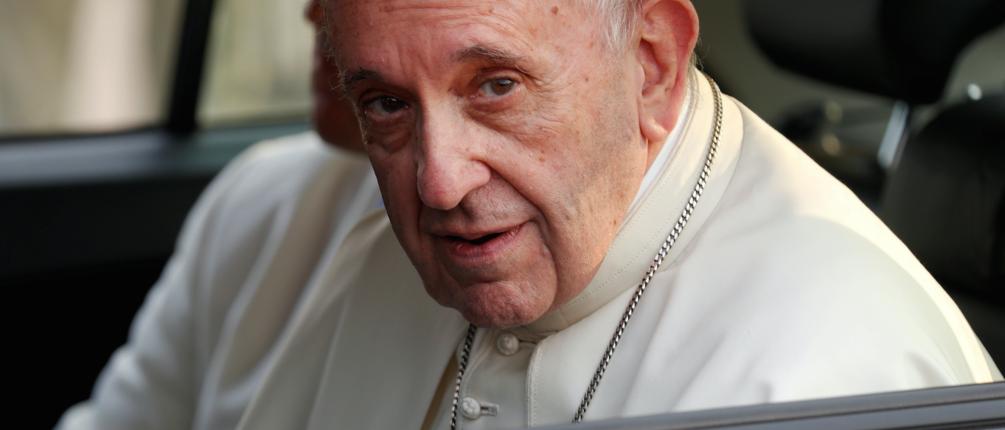
* “For things to remain the same, things will have to change”, Giuseppe Tomasi di Lampedusa
Further reading:
Klaus Schwab and his great fascist reset
Charles’ empire: the royal reset riddle
Source: Winter Oak

No comments:
Post a Comment